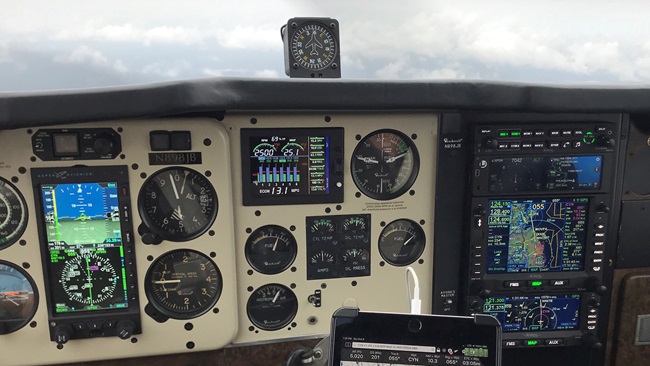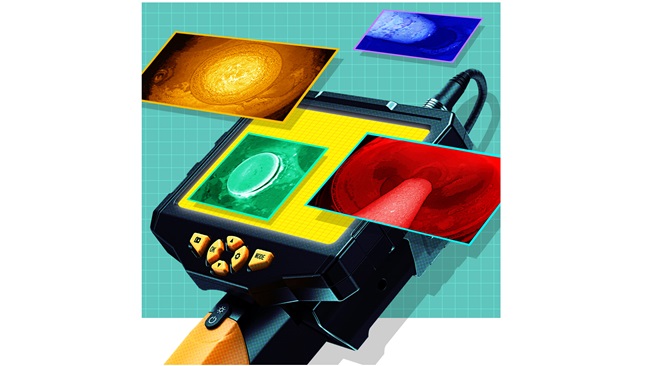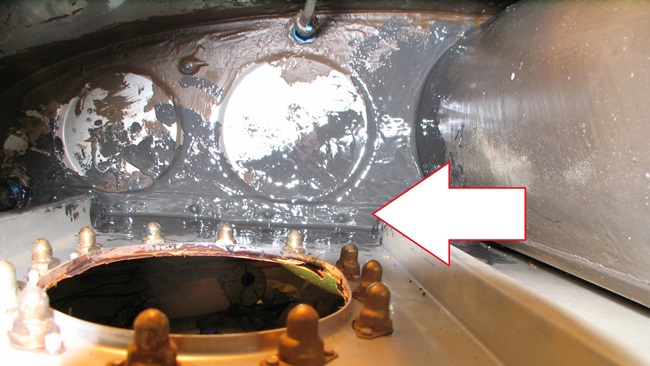Improper disinfectant appears to damage two Skyhawks
Disinfecting aircraft requires proper substances, techniques
An aircraft renter with a distillery-produced sanitizer meant well, but improper disinfecting techniques damaged the instrument panels of two Cessna 172s at Florida’s Atlas Aviation and required costly repairs.
Certain alcohol-based liquids may help disinfect hands, but they can be dangerous to airplane avionics, instrument panels, and other components of aircraft interiors, the flight school learned.
Atlas Aviation founder Deric Dymerski said a customer wielding a rag and an alcohol disinfectant made by a distillery might have meant well, but overspray from a control yoke wipe-down that then baked in the hot Florida sun permanently pock-marked the panels of a 2001 Skyhawk 172SP and a 2005 Skyhawk 172R.
The damage occurred despite cockpit and aircraft sanitizing procedures that were established (but not adhered to in this case) after consulting with other FBOs and schools before flights resumed after a monthlong coronavirus pandemic shutdown.

Prior to flights, pilots at the company’s main Peter O. Knight Airport location and the satellite location at Plant City Airport, are issued a plastic bag with wipes and an approved disinfectant-cleaner for pre- and postflight wipe-downs. Additionally, line personnel sanitize the fleet of 12 rental aircraft when they’re serviced so a “triple check” is in place to avoid pathogen contamination, Dymerski explained.
Altruistic owners of distilleries pivoted from making vodka, tequila, or rum and provided stopgap hand sanitizer solutions to bolster the supply chain during the early throes of the coronavirus pandemic when consumer panic cleaned out commercially available disinfectant wipes from stores.
The Centers for Disease Control and Prevention warned that while certain forms of alcohol are useful in controlling surface bacteria, the substance has “shortcomings” that can harm medical equipment, electronic devices, and other sensitive gear. Researchers cautioned that inadvertent damage to “the shellac mountings of lensed instruments” could occur, and prolonged or repeated use tends to “swell and harden rubber and certain plastic tubing” and harm other materials.
Similar materials are found in aircraft instrument panels and other interior parts that come in contact with pilots, crew, or passengers.
Garmin’s Joey Ferreyra, who helped outfit avionics for the 2019 AOPA Sweepstakes Super Cub, previously told AOPA that “using the wrong cleaner can be bad news for avionics.” A service advisory informs pilots how to clean and disinfect touch screens and function knobs with specific guidance about reducing the spread of disease while preserving the integrity of the avionics devices. Disinfectant solutions of 70 percent isopropyl alcohol are acceptable and provide the “best combination of bactericidal effectiveness and equipment safety” as long as they don’t contain ammonia.
MyGoFlight’s Dominic “Nic” Martinez reminded pilots to also exercise caution with electronic flight bags and tablets that contain an “oleophobic layer” that reduces oils and grime and adds anti-glare protection for improved visibility.

Presnell said he believes the aircraft damage occurred at the school’s Plant City location, after one of the Skyhawks was put away for the day. “I noticed the panel looked terrible and I thought, ‘Oh my gosh, it looks corroded.’” He initially presumed water leaking from a windscreen or a window might be the culprit. “A few days later I noticed another airplane was equally damaged.” That led to the discovery of a spray bottle containing a mysterious chemical nestled in the aircraft.
Dymerski tested the spray on another portion of an airplane and then consulted with a local distillery. He concluded that the 80-percent ethanol solution was distilled by a vodka producer. The damage occurred after it was sprayed on—and not immediately wiped from—the painted avionics panels. He suggested that chemicals added to the solution to sanitize human skin without irritating it, along with sustained high ambient heat, were likely contributing factors to the damage. He said a lesson learned was that using sanitizing solution made from distilled spirits “will kill anything, including aircraft panels.”




